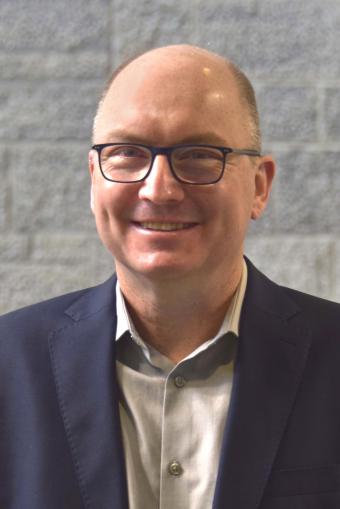Dr. Timothy Kennedy
Professor, McGill University
Dr. Timothy Kennedy, Professor, McGill University
Professor Tim Kennedy is a member of the Departments of Neurology and Neurosurgery, and Anatomy and Cell Biology at McGill University. Professor Kennedy was born in Peterborough Ontario, grew up in Toronto, and trained as an undergraduate in the Biology and Psychology program at McMaster University in Hamilton, Ontario, graduating in 1985. He obtained his Ph.D. in the department of Physiology and Cellular Biophysics at Columbia University in NYC, investigating how changes in gene expression contribute to long-term memory formation. In post-doctoral studies at UCSF he and his colleagues identified a family of proteins that they named netrins.
The Kennedy laboratory at McGill University’s Montreal Neurological Institute (1996-present) is focused on investigating the fundamental cellular and molecular mechanisms that underlie neural circuit formation, myelination, and plasticity. His laboratory studies the significance of these mechanisms to neural development, to mature brain function, and to neurodegenerative disease. Ongoing studies in the Kennedy lab focus on the molecular mechanisms that regulate initial myelination during development, the maintenance and plasticity of mature myelin, and that promote oligodendrocyte (myelin-producing cells) survival and myelin regeneration in demyelinating diseases like multiple sclerosis (MS). Supporting these goals, he is the codirector of the McGill Program in NeuroEngineering which promotes collaborations between neuroscientists, physical scientists, and engineers to develop new tools to study the nervous system and new methods to promote recovery of function that has been lost due to injury or disease.
Learn more about Dr. Kennedy
What is the focus of your research? How did you become interested in MS research?
Myelin is damaged and lost in individuals with MS, resulting in the disruption of neural signals, nerve cell degeneration, and the debilitating symptoms of the disease. It is critically important to highlight that the healthy nervous system has the capacity to remyelinate and that remyelination supports axon integrity and the survival of nerve cells, but remyelination becomes very limited in MS, particularly in progressive MS. Developing new therapeutics against new targets that promote myelin repair, remyelination and regeneration is a clear unmet clinical need. We aim to identify new molecular mechanisms that promote remyelination and the maintenance of healthy myelin. A major focus of our studies is the adhesive connections that anchor myelin to an axon that function to promote myelin health and prevent axonal injury, however, remarkably little is known about the molecules that direct the formation and stability of the specialized junctions that anchor myelin to an axon. Our studies aim to determine how mechanisms that we discovered are required to maintain healthy myelin, may contribute to promoting remyelination. I did not come to MS research directly but was trained in molecular and cellular neurobiology. Findings we obtained early on in my own lab pointed us to oligodendrocytes (myelin-producing cells), which, at the time, was a surprise. Trying to understand these findings, we serendipitously showed our results to a local colleague who studies MS. He emphasized the potential significance of the findings and strongly encouraged us to address issues related to MS. Since that time, a major focus of my lab has been to identify new biochemical mechanisms that are critical for myelin formation, myelin maintenance and plasticity, demyelination, and remyelination.
What inspires you to continue advancing research in this field?
It is critical to highlight that the healthy nervous system has the capacity to remyelinate and that remyelination supports axon integrity and the survival of nerve cells. Oligodendrocytes and their precursor cells are present in the nervous system of individuals with MS, but the capacity to remyelinate becomes very limited, particularly in progressive MS. We are inspired by the very tangible possibility that the disabilities caused by MS might be reversed by targeting mechanisms that promote remyelination.
How do you hope to change the lives of people living with MS through your research?
The therapeutic potential of our project is two-fold. By identifying new molecules that are essential for the formation and stability of myelin, we aim to uncover new targets for drugs that will protect existing myelin and stop demyelination. Second, by identifying new molecules that regulate remyelination in the mature nervous system, we aim to identify new targets for drugs that will promote myelin repair and recovery of function in people with demyelinating diseases like MS.
What do you enjoy most about your research? What are some of the challenges you face?
Research science is always new, always full of surprises, and every day is different. It is a tremendous privilege to have the daily opportunity to interact in the lab with enthusiastic young trainees, together with accomplished colleagues, all working to answer questions that aim to promote health and improve quality of life. Research involves challenges at many levels. Identifying the critical question is often a challenge, but once the key question comes into focus, the interesting challenges are often technical. It is particularly exciting to be doing biomedical research at a time when the power of the tools available is increasing so rapidly. The application of these powerful tools to key questions, at every level, is providing unprecedented new insight into the fundamental cellular and molecular mechanisms that underlie human health and disease.
How important is the support from MS Canada in your research?
Support from MS Canada has been essential for our past studies that resulted in the discovery of a new molecular mechanism that promotes myelin maintenance in the central nervous system. Support from MS Canada is critical to carry out the work we have proposed to address the possible contribution of this mechanism to remyelination and to move the field forward towards a cure for MS.
